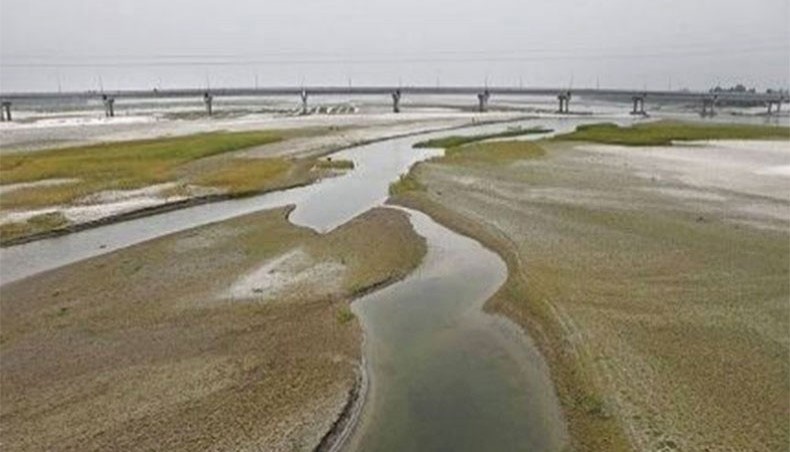FAILURE TO SIGN TEESTA, FENI DEALS Deals on six rivers put on hold
The government has put on hold negotiations on reaching agreements on sharing of waters of six transboundary rivers as Bangladesh and India have failed to sign an agreement on sharing of waters of Teesta and Feni rivers in spite of formal commitments from two successive Indian prime ministers in the past six years.
The six rivers are Manu, Muhuri, Khowai, Gumti, Dharla and Dudhkumar.
Officials are sceptical about the possibility of signing an agreement on sharing Teesta waters during prime minister Sheikh Hasina’s next visit to New Delhi.
Tentative dates of the visit were set twice, for December 2016 and February 2017, only to be deferred without any further schedule. The two sides are, however, working on the possibility of holding the visit by April, officials said.
State minister for water resources Muhammad Nazrul Islam said told New Age on Wednesday that the Teesta issue would be discussed during the prime minister’s visit to India.
‘Water is a very important issue for us and the prime minister is aware of that,’ he said over phone. ‘She will raise the matter.’
Asked at his office on January 10 about the progress in negotiations on the sharing of waters of seven other common rivers, Nazrul said, ‘We could try to make progress in negotiations on signing agreements on sharing waters of seven common rivers. But, now, our priority is to reach an agreement on Teesta River.’
There is an understanding that the two sides would engage in ‘expedited actions’ for signing agreements on six common rivers following the spirit and formula likely to be adopted in making deals on Teesta and Feni rivers, officials with the knowledge of the matter said.
India has been dillydallying for over five years on signing agreements on the sharing of waters of Teesta and Feni rivers in spite of formal directions from the highest political levels.
The formal directions were issued during the visits of Indian prime minister Narendra Modi in 2015 and his predecessor Manmohan Singh in 2011 in Dhaka for making the deals on fair and equitable basis, reached through protracted negotiations continued for several decades.
After finalising the draft of the Teesta deal by the two sides, India had backtracked on its signing several hours before arrival of Manmohan Singh in Dhaka on September 6, 2011 on the plea that West Bengal chief minister Mamata Banerjee had objected to the signing of the agreement.
Prime minister Sheikh Hasina had requested Modi, during his visit here, for immediate conclusion of the interim agreement on the sharing of the water of Teesta on fair and equitable basis as agreed upon by both the governments in 2011.
The two sides have agreed in the draft on a 50-50 water sharing ratio after keeping 20 per cent of Teesta waters as environmental flow during lean season.
Modi had conveyed that ‘deliberations are underway involving all stakeholders with regard to conclusion of
the interim agreements on sharing of waters of Teesta and Feni as soon as possible,’ according to the joint declarations of the two governments issued after the visit of Modi here on June 7, 2015.
The two prime ministers had noted that discussions on various aspects relating to sharing of waters of Manu, Muhuri, Khowai, Gumti, Dharla and Dudhkumar rivers were taking place at technical levels under Joint Rivers Commission and asked the officials concerned for taking ‘expeditious action to conclude the sharing arrangements at the earliest,’ the joint declaration said.
In Bangladesh, every bilateral visit with India ‘is measured on a strict barometer of gains and losses, and the signing of the Teesta deal has itself become a benchmark,’ said New Delhi-based Observer Research Foundation fellow Joyeeta Bhattacharjee.
Indian state minister for external affairs MJ Akbar at a press conference on January 4 expressed hope that the two countries would be able to sign an agreement on the Teesta River during the next visit of prime minister Sheikh Hasina to New Delhi.
India and Bangladesh share 54 common rivers of which agreement has been reached only on sharing of water of the river Ganga, based on a sharing formula of the flows measured at Farakka, during the lean season each year, from January 1 to May 31. The 30-year treaty signed in 1996 is renewable by mutual consent.
Bangladesh also shares Sangu, Matamuhuri and Naf rivers with another neighbour Myamar.
Centre for Environmental and Geographic Information Services, an independent research organisation established by the government,
identified 16 more rivers as transboundary rivers in addition to 57 common rivers with India and Myanmar.
- See more at: http://www.newagebd.net/article/8763/deals-on-six-rivers-put-on-hold#sthash.a3nZbYyp.dpuf











